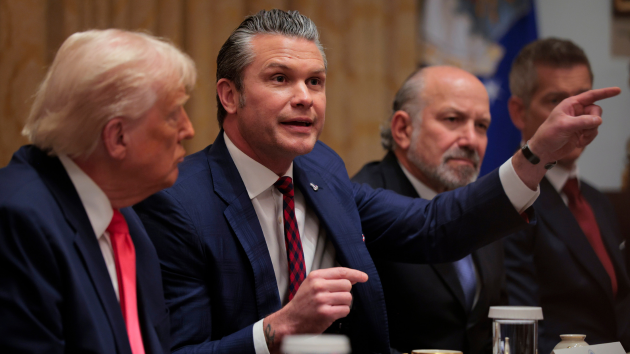Supreme Court sympathetic to online age verification for hardcore porn
Written by ABC Audio All Rights Reserved on January 15, 2025

(WASHINGTON) — Concern over dangers to children from increasingly easy access to hardcore pornography online dominated U.S. Supreme Court arguments on Wednesday in a high-profile dispute over a growing number of state laws requiring adult websites to verify the age of users.
The justices heard an appeal from an adult entertainment industry trade group challenging a 2023 Texas mandate that sites with more than a third of content containing “sexual material harmful to minors” must receive electronic proof that a patron is 18 or older.
In all, 18 other states have similar age-verification measures as a means to limit access by minors.
Allowing the Texas measure to stand, industry attorney Derek Shaffer told the justices, “could open the door to an emerging wave of regulations that imperil free speech online.” Many members of the court seemed inclined to support the law nonetheless.
While all states have long made it illegal for brick-and-mortar sellers of pornography to serve underage buyers, the industry alleges Texas’ online verification law uniquely threatens individual privacy and data security for millions of adults who otherwise have a First Amendment right to view the material.
The law requires users to provide digital ID, government-issued ID or other commercially reasonable verification methods, such as a facial scan or credit card transaction data.
“You should have confidentiality that is legally assured,” said Shaffer.
A federal district court sided with the industry and blocked the law; the Fifth Circuit Court of Appeals reversed, finding that it served a legitimate government interest notwithstanding any imposition on the rights of adult consumers.
“Age verification today is simple, safe, and common, including non-identifying means,” said Texas Solicitor General Aaron Nielson.
Many of the justices seemed eager to find a way to allow the Texas law to remain in force in the interest of protecting children, but also to clarify the strong constitutional protection for free speech that prevents states from excessively infringing on free speech rights.
“Technological access to pornography, obviously, has exploded, right?” observed Chief Justice John Roberts. “It was very difficult for 15-year-olds to get access to the type of things that are available with a push of a button today. And the nature of the pornography, I think, has also changed.”
Roberts implied that the court may need to revisit its precedents that have offered sweeping protection to adult content creators and the adults who consume the material.
Justice Amy Coney Barrett, a mother of seven, said she knew firsthand how pernicious the dangers of online pornography have become.
“Kids can get online porn through gaming systems, tablets, phones, computers. Let me just say that content-filtering for all those different 25 devices, I can say from personal experience, is difficult to keep up with,” Barrett said. “I think that the explosion of addiction to online porn has shown that content-filtering isn’t working.”
Justice Brett Kavanagh, a father of two teenage daughters, pressed Shaffer over the harms that he suggested states must be able to protect against.
“Do you dispute the societal problems that are created both short term and long term from the rampant access to pornography for children?” Kavanaugh asked.
“That is a complicated question that I don’t know that I can speak to definitively,” Shaffer replied.
Justice Samuel Alito bluntly expressed skepticism of the industry’s claim that less-restrictive alternatives exist to protect kids online, such as parental controls and content-filtering software.
“Come on, be real,” Alito chided Shaffer. “There’s a huge volume of evidence that filtering doesn’t work.”
Several justices, while vocally supportive in principle of the need to prevent children from viewing porn, voiced concern that the means states like Texas were using put too much burden on the content creators and adult consumers.
“It’s not clear to me that just the fact that we have new technology is running in favor of allowing this law to stand as is,” said Justice Ketanji Brown Jackson, a mother of two teenage girls.
“We appreciate the state’s interest in protecting children,” Jackson told Nielson, “but we’re not going to let the state, you know, impose, like, a thousand things that would make it really, really hard for adults when there are other alternatives to protect children.”
Justice Clarence Thomas echoed that sentiment: “Assuming we agree with you, and I think most people do, that kids are to be protected, how much of a burden is permissible on adults’ First Amendment rights?” he asked Nielson.
“One of the important parts of modern age verification technology is that you can do it without identification at all,” the Texas attorney replied. “In other words, there’s no ID or anything like that. It’s just a face scan.”
Justice Sonia Sotomayor suggested the rights of adults to engage in free speech — and free consumption of sexually explicit content — needed guarantees.
“This law … says you can’t retain this information. The other side in its brief argues that that doesn’t mean you can’t sell it or give it away,” she pointed out to Neilson.
“I don’t know if that’s even technologically possible,” he replied.
The case, Free Speech Coalition v. Paxton, pits a growing nationwide effort to strengthen protections for minors online against a booming multi-billion dollar adult entertainment industry.
“More people watch porn and view porn each year than vote and read the newspaper,” said Lisa Blatt, a veteran Supreme Court litigator with Williams & Connolly LLP.
A 2016 study in the Journal of Sexual Medicine found that up to 70% of men and 40% of women have consumed pornography within the past year in the U.S.
American teenagers have reported similar levels of exposure to pornography a number of studies conducted over the past three years show. Public health experts say young people who view sexually explicit content are more likely to start having sex earlier, engage in unsafe sex, and have multiple partners.
Twenty years ago in a remarkably similar case — Ashcroft v. ACLU — the high court struck down federal legislation that would have required age verification to view sexually explicit material. The decision instead put the onus on parents and technology companies to utilize less burdensome content-filtering software.
The court could choose to rethink that decision and other precedents on these issues, or return the case to a lower court for further consideration under a clarification of existing law.
A decision is expected in the case by the end of June.
Copyright © 2025, ABC Audio. All rights reserved.






 KVSP
KVSP